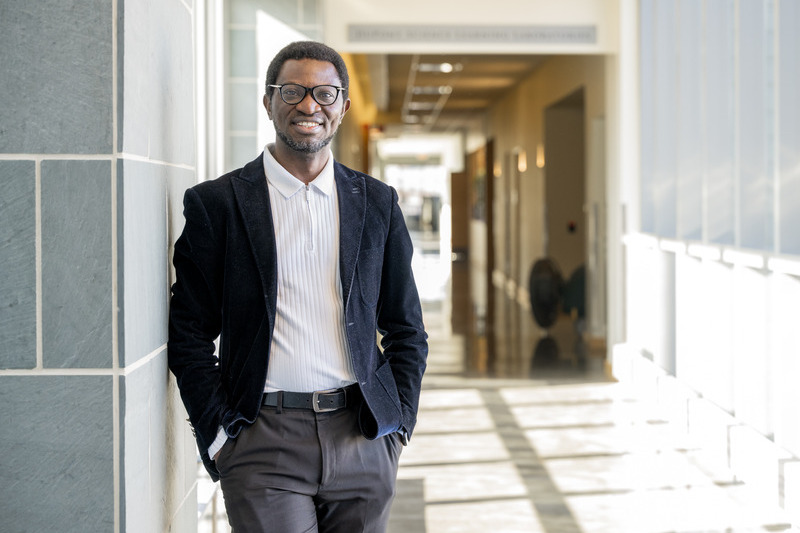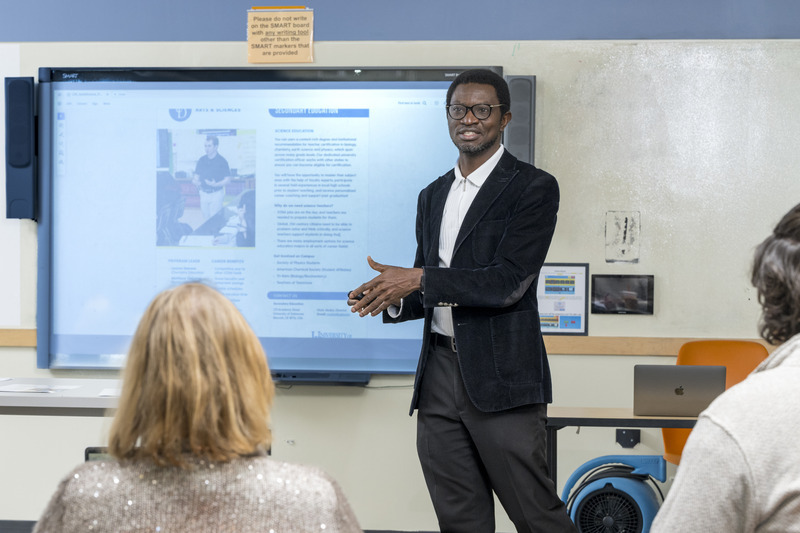


Forward-thinking science teaching
Photos by Kathy F. Atkinson January 24, 2025
Mark Akubo helps aspiring science teachers at UD learn strategies to speak to the diversity of today’s classrooms
Growing up near the World Bank’s agricultural development project in Anyigba (present day Kogi State, Nigeria), Mark Akubo and his friends would visit the aerodrome to watch light planes take off and land, sparking Akubo’s wonder at examining the world around him and thinking about how things work. The group began building models of planes and cars out of material they found lying around — wire, tin cans, sticks, string and even bathroom slippers for tires.
That early excitement inspired Akubo to pursue a science track in high school, and helping classmates study for exams made him discover his love for teaching.
Akubo joined the University of Delaware faculty in fall 2023. The assistant professor of physics and astronomy is also the director of secondary science education, shepherding future middle and high school teachers through mastering their chosen content area in biology, chemistry, earth science or physics, while learning effective teaching methods.
Akubo lived in Nebraska, Florida and New York before coming to Delaware. He draws on his life experiences to connect with his students, and he inspires them to do the same with their own students. He believes that understanding each person’s unique identity and life journey helps students of all levels master the sciences.
UDaily spoke with Akubo to ask about his life in Nigeria, his identity and how he is preparing the next generation of science teachers.
Q: How does your identity impact your role as the director of secondary science education?
Akubo: I believe in the intersecting identities that each person has, and I put my own identity in conversation with other people’s identity. I am a scholar, I am a STEM education researcher of Black and African ancestry, a cisgender man, and I am a professor of physics and astronomy — all of these are integrated. This helps me understand the experiences of people who are different than I am. No one needs to be disadvantaged because of who they are, where they come from and what they have access to. Their experiences matter in how they thrive in science classes.
Having frank, open conversations is a skill students need to learn. In today’s STEM fields where the emphasis is on interdisciplinary research, you need the skills for conversation and collaboration. Having the skills to navigate team diversity in an equitable and inclusive way is non-negotiable.

Q: Why is it important for students to study physics?
Akubo: Having a handle on physics is a game-changer in today’s economy. Much of the fundamental research being done today in disciplines such as medicine, chemistry, biology, veterinary science and engineering benefits from physics. Physics can contribute in a powerful, influential way or hinder students along their path.
Physics is also fundamental in the home in understanding and explaining the phenomena that surround us.
Imagine for a moment that very young Johnny has just watched a movie in which he saw a person who had put a frying pan on the stove mistakenly touch the handle of a spoon they left in that frying pan — it would be hot. Johnny wonders how that happens and shares his curiosity with a parent. This is a chance for the parent to explain that there is heat energy transfer through conduction through some materials and to explain why the handles of pots are made from wood or rubber or plastic because they are insulators against heat.
Physics and the natural sciences are an everyday experiential subject that we breathe and live, even if we are not conscious of it.
Q: What advice do you have for students considering secondary science education?
Akubo: The pandemic highlighted inequities in pre-K through grade 12, and many students are still reeling and trying to catch up with the loss they experienced. My courses teach my pre-service teachers to design lesson plans that reflect on these inequities.
Prospective teachers also need to be mindful of developing their proficiency at teaching less homogeneous demographics in their classrooms. The majority of teachers are from the white demographic and mostly women, but Delaware classrooms are becoming more diverse with an increasing number of students of color.
This means teachers have to care about who their students are, where they come from, in terms of their racial identity, their gender identity, their socioeconomic identity. They can leverage this information to design their own instructional strategies, or their pedagogies. All of these are important.
In my classrooms, I highlight student responsive teaching and culturally relevant pedagogies that push the teacher candidates to be much more reflective about who they are themselves, because if they understand their own identities, they can put those identities in conversations with their own students’ identities and then design lesson plans that can help bridge differences and so have the greater potential to teach in an increasingly equitable way.
Contact Us
Have a UDaily story idea?
Contact us at ocm@udel.edu
Members of the press
Contact us at mediarelations@udel.edu or visit the Media Relations website

